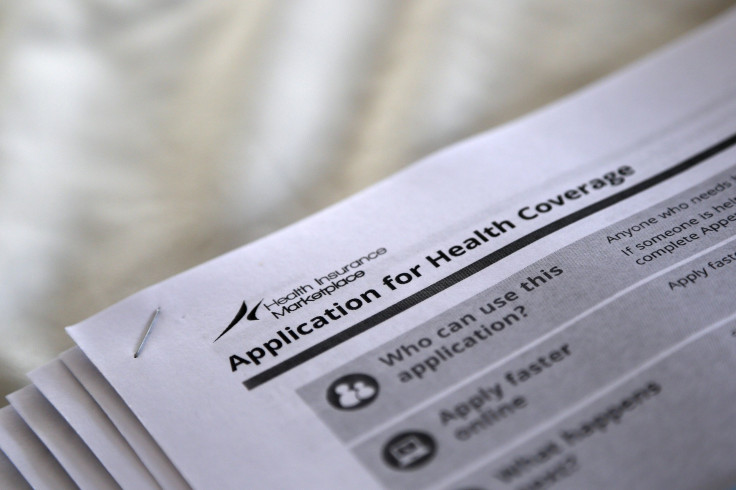More Problems For Obamacare? 1.4 Million To Lose Health Insurance Next Year Under Affordable Care Act As Insurers Exit Government Markets

At least 1.4 million people from 32 states could lose their health insurance under the Affordable Care Act, commonly known as Obamacare, as their plans are set to disappear from the program next year. They will have to find new coverage in a market that will likely have fewer options and higher prices, Bloomberg reported Friday.
The coverage losses come after Aetna and UnitedHealth Group, as well as some regional insurers, announced they plan to leave Obamacare's markets in 2017 and instead offer individual coverage outside of the program’s exchanges. That means there will be fewer, but more expensive, plans, and the same doctors and hospitals people used before may not be included under the Affordable Care Act, regulators and insurance customers told Bloomberg.
At least 1.4 million people in 32 states will lose the Obamacare plan they have now https://t.co/RmjoJuA9dh pic.twitter.com/TUomNC1zfe
— Bloomberg (@business) October 14, 2016
Obamacare's healthcare exchange has been up and running for just over three years now and is still a subject of perpetual scrutiny. Many Republican politicians see it as the federal government overstepping its boundaries. Under the law, all Americans must have insurance or pay a fine. Insurers, meanwhile, claim it puts a strain on their business and some employers take issue with its coverage mandates. UnitedHealthcare, the nation's largest insurer, said it would lose about $1 billion on Obamacare policies in 2015 and 2016. Aetna, the nation's third largest health insurance company, announced earlier this year it would lose $300 million on the plans.
"Providing affordable, high-quality health care options to consumers is not possible without a balanced risk pool," said Aetna CEO Mark Bertolini at the time.
Since Obamacare's outset, there has been a steady increase in Americans who have health insurance. The number of people without health insurance coverage was 29 million in 2015, down from from 33 million without coverage in 2014, according to the U.S. Census Bureau. In all, just 9.1 percent of Americans lacked health insurance in 2015, 1.3 percentage points less than in 2014.
Many insurers still say, however, that they aren't profiting on the government's exchange in large part because they are often providing coverage to older people who require more care. The Obama administration recently launched an initiative to get more young people onboard with Obamacare, which would help offset the cost of insuring older people.
"It seems increasingly clear that big, national insurers are having trouble competing in the Obamacare marketplaces and making money," Larry Levitt, senior vice president at the Kaiser Family Foundation, told CNN Money. "Some insurers are still doing well, particularly those that historically served Medicaid beneficiaries."
The controversy over the exchange has put Obamacare front-and-center as an issue on the 2016 campaign trail. Republican nominee for president Donald Trump has called it a "total disaster" that is beyond repair, while his Democratic opponent, Hillary Clinton, has said it just needs to be tweaked and fixed. Obamacare was even at the center of a campaign gaffe after former President Bill Clinton said it was "the craziest thing in the world," a claim he later had to walk back to fall in line with his wife's position.
If insurers leave government-run marketplaces, Obamacare enrollment could shrink in 2017 for the first time. In March, there were 11.1 million people covered under the health care law. But enrollment next year could see an 8 percent decline, an Oct. 13 S&P Global Ratings report predicted.
"The ongoing and nationwide exodus of insurers is just the latest piece of evidence that Obamacare is a failed law built on false promises," Michael F. Cannon, director of health policy studies at the libertarian Cato Institute, wrote for Time in August.
The states where people will lose their Affordable Care Act policies include Florida, North Carolina, Illinois and Pennsylvania, among others. The government plans to contact people who will no longer have coverage and encourage them to sign up with new plans.
"It’s part of the normal business cycle for insurers to discontinue, change, and replace plans from year to year," Benjamin Wakana, a spokesman for the Department of Health and Human Services, told Bloomberg by e-mail on Oct. 5. "Such changes don’t prevent people from obtaining coverage. People can shop for new coverage through a transparent market."
Obamacare's 2016 open enrollment period opens Nov. 1 and ends in January.
© Copyright IBTimes 2024. All rights reserved.












